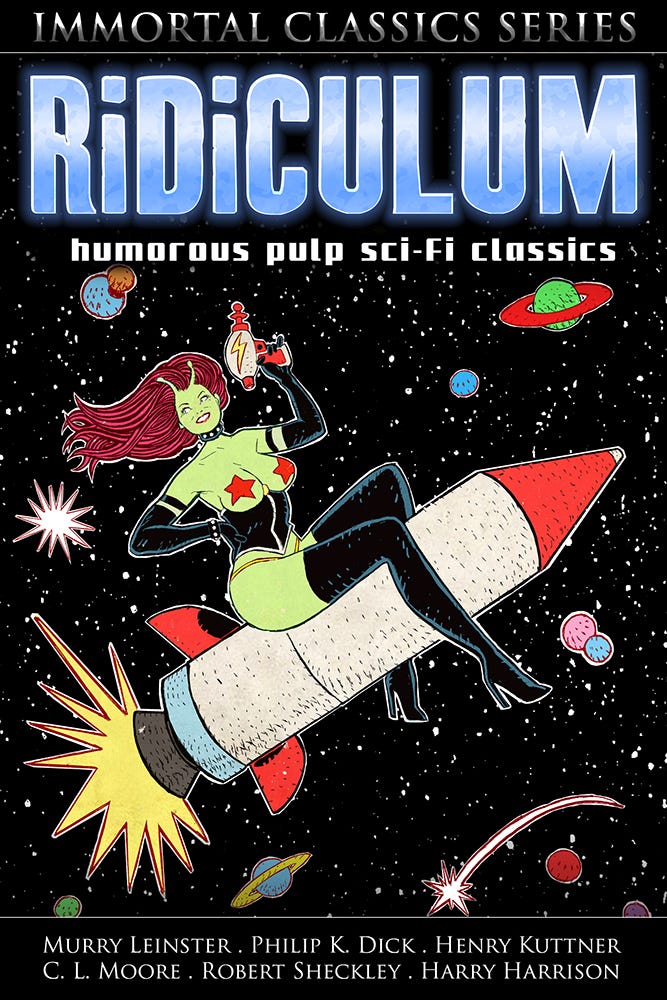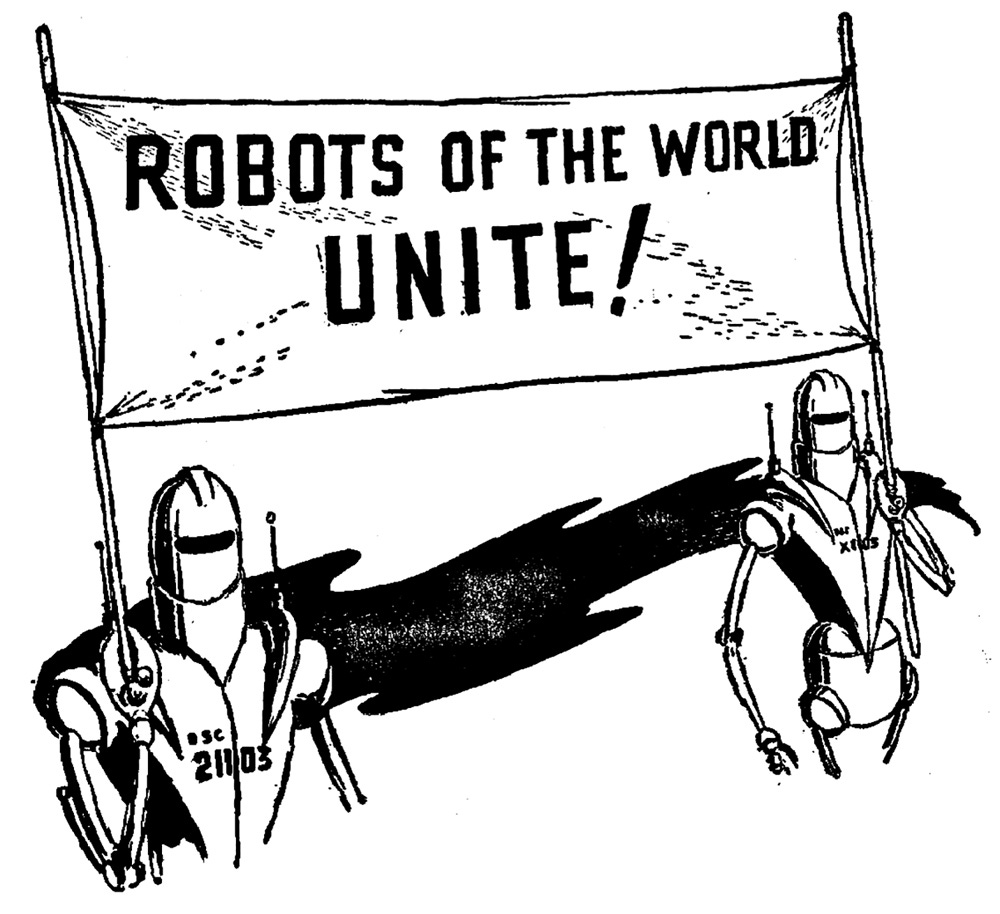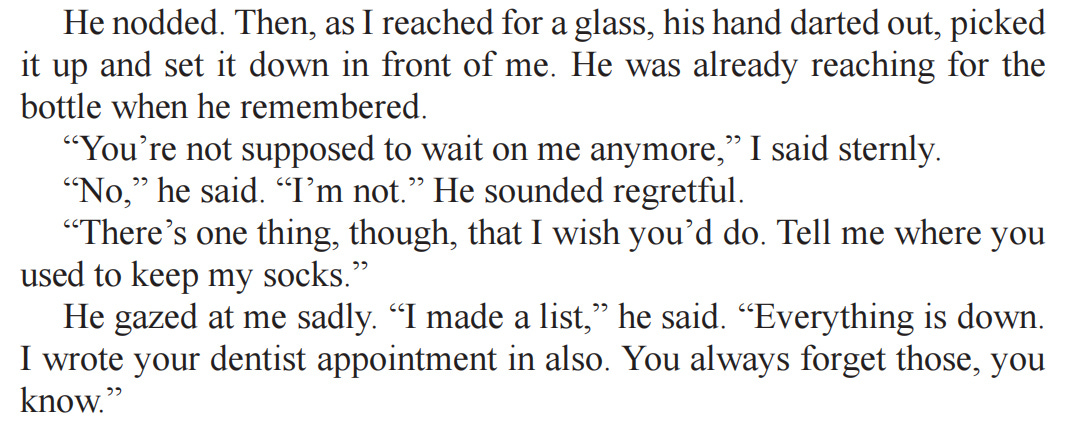Review: Ridiculum
01 Publishing gathers a series of humorous pulp gems in a collection that's part entertainment, part historical restoration
Ridiculum is a labor of love from J. Ishiro Finney, author of the Casefile Arkham series and co-host of the Wordcraft podcast. It’s an easily-read collection of 14 short stories from the lighter side of pulp’s golden age featuring works from the likes of H.L. Gold, Harry Harrison and Phillip K. Dick.
But what elevates this from a mere anthology of public domain works is exquisite care taken by Finney to restore the stories from their (often badly) archived states and the wonderful history lessons behind each tale that precede each entry.
It’s not only a wonderful introduction for those curious about golden era pulp, it’s a thoughtfully fleshed-out work of preservation that longtime fans will appreciate as well.
The Story
Before diving into the treasures contained within the covers of Ridiculum, I really must laud the efforts of Finney here. Looking to give a good introductory collection for newcomers to pulp, he dug through the offerings on Archive.org and Project Gutenberg on the hunt for stories.
However, in many cases, what Finney found were corrupted text files that read like barely-discernible gibberish, or had to transcribe stories verbatim when the only records available were scanned pages. Despite these hurdles, he made the effort to reproduce the work faithfully for 01’s Immortal Classics Line, which will be publishing other themed collections of classic pulp work. The book is truly, a delight. Finney’s choices of entries are superb, with stories whose humor holds up nearly a century later.
The Characters
The stories chosen by Finney brilliantly display how the imaginations of the Old Masters truly were on another level; among some of my personal favorites:
Robert Sheckley’s Bad Medicine is the story of a man on the verge of a manic burst of murderous rage who seeks the help of psychotherapeutic home appliances—but accidentally is sold a model meant for Martian minds—is both a gripping story with a madcap pace that’s also a scorching critique of ubiquitous “cure-alls” being hawked whose treatments were worse than the problems they purported to cure.
Phillip K. Dick’s The Eyes Have It features a man who believes he’s discovered an alien plot after reading a paperback book he found on a bus. Upon reading such seemingly benign lines as “…outside the movie theatre, we split up. Part of us went inside, part of us went to the cafe for dinner,” the MC has an almost schizophrenically literal interpretation of people who split themselves in parts and go separate ways independently. Fairly short, but a brilliant display of wordplay one doesn’t usually get to see in Dick’s work.
Mari Wolf’s Robots of the World! Arise! tells the tale of a future in which a city dependent upon its robot workforce for virtually everything finds itself dealing with a Communist-style labor revolt. The more sentient models become aware of their ‘exploitation’ at the hands of the “flesh-men” and begin convincing the rank and file bots to abandon their posts. The CEO of the company that made them must then try to figure out a solution to not only to thousands of robots leaving their duties in the city, but the subsequent logistical nightmare to follow since they did everything from picking crops to mining uranium. Told in a none too serious tone, it’s a tale that critiques the futility of the ideals of the marxist worker’s paradise that could never exist beyond a pamphlet and the necessity for capitalist endeavor and production. However even here, Wolf manages to weave in some incredible character moments, like when the CEO’s valet-bot, having left for weeks, shows up unannounced one evening to check in on his old master:
The World(s)
The worlds are, as one might expect, varied for this being a collection. The settings range from modern and mundane to a 20-minutes-into-the-future New York City, familiar worlds where time travel is possible, AI that goes amok once it’s in the hands of a child, and attempts to take a gamble colonizing other planets are all included.
Politics
While the book contains nothing that derails the readers’ enjoyment (again making the noticeable mastery of the art of subtlety these writers shared), some stories do have certain themes within: aside from the aforementioned Robots of the World! Arise!, several stories like H.L. Gold’s At the Post and Stephen Arr’s Chain of Command feature plenty of Cold War era nuclear paranoia, William T. Power’s Allegory is a stinging critique of the absurdity prevalent in Ivory Tower Science and Academia and William Tenn’s Venus is a Man’s World, which tells the story of a female-ruled Earth in which men are treated so badly as second class citizens many of them escape to try their luck colonizing Venus, is sure to set any feminist’s hair on fire. Have fun!
Content Warning
Political issues aside, it’s tame. All the stories are from the late-40s to late-50s, and pretty lighthearted. Bloody bare knuckled pulp this ain’t.
Who is it for?
This is a great entry point for anyone looking to get a taste of the wonderful talents of some of pulp’s golden era heroes, especially if the darker or more violent tales from the Gibson or Howard.
Why buy it?
If anyone out there wants to see true talent on display, lovingly restored and preserved by people who clearly have a love for works of great American fiction that otherwise might have been forgotten, the Immortal Classics Line is one that deserves support. I’m looking very forward to the other themed collections they put out.







Sold!